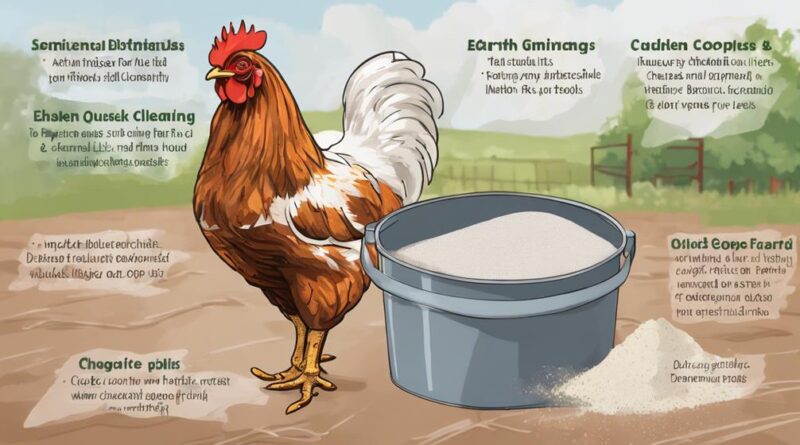7 Best Methods for Chicken Lice and Mite Control
To control chicken lice and mites effectively, try using essential oils like lavender and peppermint or a vinegar rinse. Ensure coop cleanliness, inspect for damage, and use proper ventilation. Provide chickens with a dust bath area and sunlight exposure. Incorporate diatomaceous earth and herbal supplements such as garlic. Maintain a clean coop environment and monitor for pests, while considering professional treatment options like permethrin. A comprehensive approach is key to eliminating these pests from your chickens and coop. Further methods await for a pest-free flock and healthier environment.
Natural Remedies for Chicken Pests
If you regularly notice lice or mites on your chickens, implementing natural remedies can effectively control these pests. Essential oils are a potent tool in combating chicken lice and mites. To create a natural spray, mix 10-15 drops of essential oils such as lavender, peppermint, eucalyptus, or tea tree with water in a spray bottle. Shake well and then lightly mist your chickens, focusing on areas where pests are commonly found. The strong scent of these essential oils will repel lice and mites, helping to keep your chickens pest-free.
Another natural remedy that can be beneficial is a vinegar rinse. Vinegar is acidic and can help eliminate pests by disrupting their cell membranes. To make a vinegar rinse, mix equal parts of water and apple cider vinegar in a spray bottle. After bathing your chickens, apply the vinegar rinse generously, making sure to saturate their feathers and skin. Leave the rinse on for a few minutes before rinsing it off with clean water. This process can help kill any remaining lice or mites and prevent further infestations.
Proper Coop Maintenance Tips
Regular and thorough coop maintenance is essential in ensuring the health and well-being of your chickens. To prevent lice and mite infestations, start by regularly cleaning the coop. Remove any old nesting material, droppings, and feathers that can harbor pests. After cleaning, consider applying a coating prevention treatment to the coop surfaces. This barrier will help deter pests from taking up residence in your chicken coop.
Inspect the coop regularly for any signs of damage or wear that could provide entry points for pests. Repair any holes or cracks promptly to prevent unwanted visitors. Additionally, ensure that the coop has proper ventilation to discourage moisture buildup, which can attract mites.
When providing nesting material for your chickens, choose options that are clean, dry, and pest-free. Avoid using materials that may already be infested with mites or lice. Pine shavings or straw are good choices that are less likely to harbor pests.
Effective Dust Bathing Techniques
Maintaining proper coop hygiene is just the first step; master the art of effective dust bathing to keep your chickens healthy and free from pests. Dust bathing is a natural behavior for chickens that helps them control parasites like lice and mites.
One effective technique is providing a sand bath area in your coop. This can be a designated spot filled with fine sand or dust where your chickens can indulge in their natural instinct to dust bathe. The abrasive texture of the sand helps to suffocate and remove parasites from their feathers and skin.
To enhance the effectiveness of dust bathing, consider incorporating sunlight therapy. Allow your chickens access to natural sunlight, as it not only aids in parasite control but also helps to dry out damp areas where mites and lice thrive. Sunlight is a natural disinfectant and can significantly reduce the parasite population in your coop.
When implementing dust bathing techniques, ensure the sand or dust is dry and loose, as this consistency is most effective for removing pests. Regularly replenish the sand bath area to maintain cleanliness and maximize parasite control.
Herbal Supplements for Parasite Control
To effectively combat lice and mites in your chicken coop, consider incorporating herbal supplements known for their natural parasite control properties. Herbal remedies have been used for centuries to ward off pests and promote overall health in poultry. When it comes to chicken lice and mite control, certain herbs and essential oils can be particularly effective in keeping these parasites at bay.
One popular herbal remedy for parasite control is diatomaceous earth, which is a natural substance made from fossilized algae. When sprinkled in your coop or dusted on your chickens, diatomaceous earth works by dehydrating and ultimately killing lice and mites on contact.
Another effective herbal supplement is garlic, known for its potent anti-parasitic properties. You can crush garlic cloves and mix them with your chickens' feed to help repel parasites from the inside out.
Essential oils such as lavender, peppermint, and tea tree oil are also excellent choices for chicken lice and mite control. These oils not only have strong insecticidal properties but also help to soothe irritated skin and promote healing. When using essential oils, it's important to dilute them properly and avoid direct contact with the chickens' eyes or sensitive areas.
Diatomaceous Earth Application Guide
Combatting chicken lice and mites effectively requires a strategic application of diatomaceous earth in your coop, a natural substance renowned for its dehydrating properties that eliminate these parasites upon contact. When applying diatomaceous earth for pest control in your chicken coop, it's essential to ensure thorough coverage for maximum effectiveness. Begin by cleaning the coop thoroughly, removing all bedding, and dusting any crevices or cracks with diatomaceous earth.
To apply diatomaceous earth, use a dust mask to avoid inhaling the fine particles. Sprinkle the diatomaceous earth powder generously in areas where lice and mites are commonly found, such as roosts, nesting boxes, and dust bathing areas. Pay special attention to the vent area and under the wings of your chickens. Reapply the diatomaceous earth after cleaning out the coop to maintain protection.
Diatomaceous earth isn't only effective for pest control but also offers gardening benefits when mixed into the soil. Its high silica content can improve soil structure and water retention, benefiting plant growth. This versatile powder is safe for home application, making it a popular choice for natural pest control in chicken coops. Remember to store diatomaceous earth in a dry place to prevent clumping and maintain its efficacy in managing chicken lice and mites.
Integrated Pest Management Strategies
Implementing a comprehensive strategy for managing pests in your chicken coop involves integrating various pest control methods for optimal effectiveness. To create a robust Integrated Pest Management (IPM) plan, follow these precise steps:
- Regular Cleaning and Maintenance: Start by maintaining a clean and dry coop environment. Regularly remove any debris, old nesting material, and uneaten feed where pests can hide. Implementing good hygiene practices is the first line of defense in pest prevention.
- Implementing Prevention Measures: Install physical barriers like wire mesh to prevent pests from entering the coop. Seal any cracks or crevices in the coop structure to eliminate potential entry points for lice and mites. Additionally, consider using natural deterrents like herbs or essential oils to repel pests.
- Utilizing Chemical Solutions: In cases where lice and mite infestations are severe, consider using chemical solutions like poultry dust or sprays. Follow the manufacturer's instructions carefully and apply these treatments in a targeted manner to minimize risks to your flock.
- Regular Monitoring and Inspection: Conduct routine checks on your chickens for signs of lice or mites. Early detection can help prevent infestations from spreading and allow for prompt intervention. By staying vigilant and proactive, you can effectively manage lice and mite populations in your chicken coop.
Professional Treatment Options

Ensure thorough eradication of lice and mites in your chicken coop by exploring effective professional treatment options available for severe infestations. When faced with a severe infestation of chicken lice and mites, utilizing chemical solutions can be a powerful tool in combating these pests. Chemical solutions such as permethrin or pyrethrin-based products are commonly used by pest control professionals to target and eliminate lice and mites effectively. These chemicals work by disrupting the pests' nervous systems, leading to their eventual demise. It's crucial to follow all safety guidelines and instructions provided by the manufacturer when using chemical solutions to ensure the health and well-being of your chickens.
In situations where the infestation is particularly challenging to manage on your own, seeking assistance from pest control services may be necessary. Pest control professionals have the expertise and specialized equipment to effectively treat severe infestations of chicken lice and mites. These experts can conduct a thorough assessment of the infested area, develop a targeted treatment plan, and apply appropriate measures to eradicate the pests completely. By enlisting the help of pest control services, you can ensure a comprehensive and efficient solution to your lice and mite problem, safeguarding the health and comfort of your chickens.
Frequently Asked Questions
Can Chicken Lice and Mites Harm Humans?
Yes, chicken lice and mites can harm humans by causing skin irritation and allergic reactions. These pests can transmit diseases to humans, posing risks to human health.
It's crucial to address infestations promptly to minimize transmission risks and protect your health.
Regularly inspecting and treating your chickens for lice and mites can help prevent these issues from affecting you and your flock.
How Do I Prevent Lice and Mites From Returning?
To prevent lice and mites from coming back, you need to focus on natural remedies and long-term solutions. Implement preventive measures and take an integrated approach.
Regularly clean and sanitize your coop, use natural repellents like diatomaceous earth, and consider incorporating herbs like lavender and mint. Ensure your chickens have a healthy diet and environment.
Are There Specific Breeds More Prone to Infestations?
Certain chicken breeds exhibit higher susceptibility to lice and mite infestations due to their feather types or natural oils on the skin.
Control methods involve regular coop cleaning, dust baths, and using diatomaceous earth.
Infestation patterns vary, with some breeds more prone to recurring issues.
Treatment options include natural remedies like essential oils or commercially available poultry dust.
Stay vigilant and proactive to keep your flock healthy and pest-free.
Can Lice and Mites Survive Extreme Weather Conditions?
In extreme conditions, lice and mites can survive but their populations may diminish. The survival rates vary based on the severity of the weather.
Extreme cold can impact eggs, reducing hatching rates, while extreme heat can also hinder their survival.
It's crucial to monitor and control infestations to prevent outbreaks, regardless of the weather conditions. Regular checks and appropriate treatments can help maintain a healthy chicken flock.
Is There a Risk of Developing Immunity to Treatment Methods?
When considering the risk of immunity developing to treatment methods for chicken lice and mites, it's crucial to monitor the effectiveness of your chosen remedies over time. By regularly assessing how well the treatments work and adjusting as needed, you can reduce the chances of immunity developing.
Keep a close eye on the lice and mite populations to ensure that your chosen methods remain effective in controlling these pests.
Conclusion
In conclusion, implementing a combination of natural remedies, proper coop maintenance, effective dust bathing techniques, herbal supplements, diatomaceous earth application, integrated pest management strategies, and professional treatment options are essential for controlling chicken lice and mites effectively.
By following these methods diligently, you can ensure your flock remains healthy and free from infestations. Prioritize the well-being of your chickens by taking proactive measures to prevent and treat these common poultry pests.
